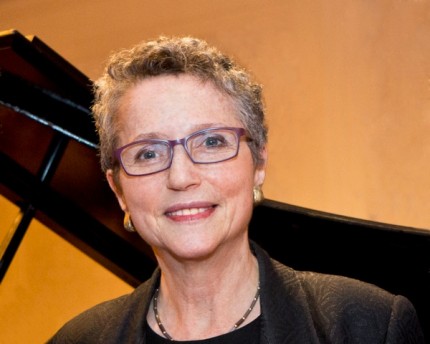Contempo opens sixth decade with a farewell to Shulamit Ran

Contempo began its 51st season Tuesday night by saying goodbye.
The farewell was for Shulamit Ran who retired at the end of last season, after 13 years as artistic director of the University of Chicago’s new-music ensemble, and 32 years as a composition professor at the school. The concert featured works chosen by Ran from across her long career, including works that predate her association with the university. Contempo’s two ensembles-in-residence, eighth blackbird and the Pacifica Quartet, were the performers at the Reva and David Logan Center for the Arts.
Lisa Kaplan, the pianist of eighth blackbird, opened the concert with Verticals for solo piano. The title of the piece refers to the pungent, sonorous chord that opens the piece and recurs frequently throughout. But it could have easily referred to the orientation towards the music that the pianist must adopt in order to bring it off. The chords need to resonate; the pianist has to work the space of the concert hall. Kaplan did this miraculously. Her pedaling was extraordinarily detailed: the pitches rang, sustained, blended, and faded with consummate control.
The remainder of the first half was devoted to O the Chimneys, a setting of five poems from Nelly Sachs’ collection of the same name, which is devoted to the Holocaust. Scored for mezzo-soprano (performed by Julia Bentley), and a mixed chamber ensemble (performed by eighth blackbird), O the Chimneys is firmly Expressionist in outlook. Its interest lies primarily in its exploration of timbral effects.
Much focus is on the percussionist, who is equipped with a battery of instruments that he must flit between, as Doug Perkins did with great agility. The strings of the piano are plucked by the pianist at one point; and the vocalist sings into them at another point. Eighth blackbird amply provided the acerbity and clarity needed to make these effects register.
The culmination of these effects comes in the final movement: “Hölle ist nackt” (“Hell is naked”). The hell of the poem’s opening is evoked with tubular chimes played by the live percussionist. But the “hum of sea shells” that drowns out everything at the poem’s conclusion is portrayed by a recorded collage of chime effects broadcast over the loudspeakers, an effective transformation of the meaning of the sound of the bells.
In the piece, even the human voice is exploited more for the varied qualities of sound it can produce, and less for its capacity to sing melodic lines. The singer is asked to mutter, shriek, simper, and sing naively like a little girl. Bentley navigated these characters nimbly.
Still, as the oldest work on the program, written in 1969, O the Chimneys was the only piece that sounded dated in style.
The second half of the concert opened with a string sextet called Lyre of Orpheus, in which eighth blackbird’s Yvonne Lam (playing viola) and cellist Nicholas Photinos joined the Pacifica Quartet. Unlike some Ran works, the music did not draw attention to its own techniques.
Written in 2009, this was the most recent piece on the program, as well as the most directly communicative, with melodious solos for the first cello, and Pacifica’s Brandon Vamos gave full-throated expression to these lyrical oases.
Eighth blackbird followed this with a performance of Mirage. The mixed chamber ensemble for this piece is led by an amplified alto flute. This is loose, sinuous music, easy to get tangled in. The performers weren’t always successful in disentangling the music, but made the tangles as opulent as possible.
The evening closed with Bach-Shards for string quartet, played by Pacifica. The piece is a prelude of sorts that leads into Contrapunctus X from Bach’s Art of the Fugue. In her program notes, Ran emphasized her decision to stay within the bounds of Bach’s own harmonic language rather than writing in a more contemporary idiom.
If one hadn’t known the title, one wouldn’t know that Bach was the composer being evoked by the piece. It has all the qualities of a Beethoven scherzo: dark, witty, rollicking. Pacifica brought out both its playful qualities and its edge, and they transferred all these qualities to the Bach fugue that brought the evening to a close.
Posted in Performances




